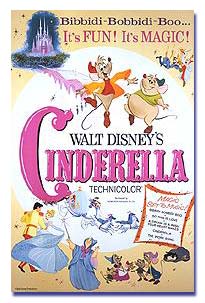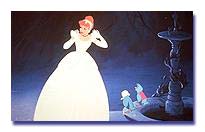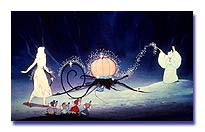


|
 he famous
rags-to-riches tale of a beautiful girl reduced to being a servant by her jealous stepmother and stepsisters,
Anastasia and Drizella. With the help of a bit of magic from her fairy godmother, Cinderella is given a beautiful
dress and use of a magnificent coach, and is able to attend the royal ball and inadvertently falls in love with
the prince. Fleeing the ball at midnight, the hour when the magic spell is due to end, she leaves behind a glass
slipper that the prince and grand duke use to search her out. With the help of her little mouse and bird friends,
she is discovered and assured a happy future. he famous
rags-to-riches tale of a beautiful girl reduced to being a servant by her jealous stepmother and stepsisters,
Anastasia and Drizella. With the help of a bit of magic from her fairy godmother, Cinderella is given a beautiful
dress and use of a magnificent coach, and is able to attend the royal ball and inadvertently falls in love with
the prince. Fleeing the ball at midnight, the hour when the magic spell is due to end, she leaves behind a glass
slipper that the prince and grand duke use to search her out. With the help of her little mouse and bird friends,
she is discovered and assured a happy future.
During "Cinderalla's" original release, the public made the film one of the highest-grossing films of the year,
and Disney's most successful release since "Bambi." Because of wartime economic problems, the Disney Studio had
to be satisfied with its "package films" such as" Make Mine Music" and "Melody Time" for several years, but by the
end of the 1940s, Walt was able to put together the financing for another full feature telling a single story. It
was a gamble for Walt, and if it had been unsuccessful, it probably would have sounded the death knell for
animation at the Studio. But its resounding success ensured that animation would continue.
Directed by Wilfred Jackson, Hamilton Luske, and Clyde Geronimi. Starring: the voices of Ilene Woods (Cinderella),
Eleanor Audley (Stepmother), and Verna Felton (the Fairy Godmother). Mike Douglas is the uncredited singing voice
of Prince Charming. 74 min. Songs include "A Dream Is a Wish Your Heart Makes," "The Work Song," "So This Is Love,"
and "Bibbidi-Bobbidi-Boo," all by Mack David, Jerry Livingston, and Al Hoffman, with "Bibbidi-Bobbidi-Boo"
nominated for the Academy Award® for Best Song. The film also received a nomination for Best Scoring of
Musical Picture. "Cinderella" was rereleased in theaters in 1957, 1965, 1973, 1981, and 1987. Released on video
in 1988.
Learn more about Cinderella at the Walt Disney Family Museum.
|